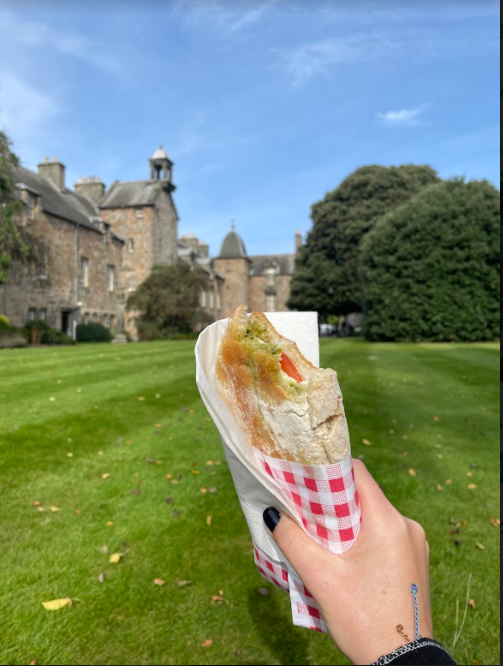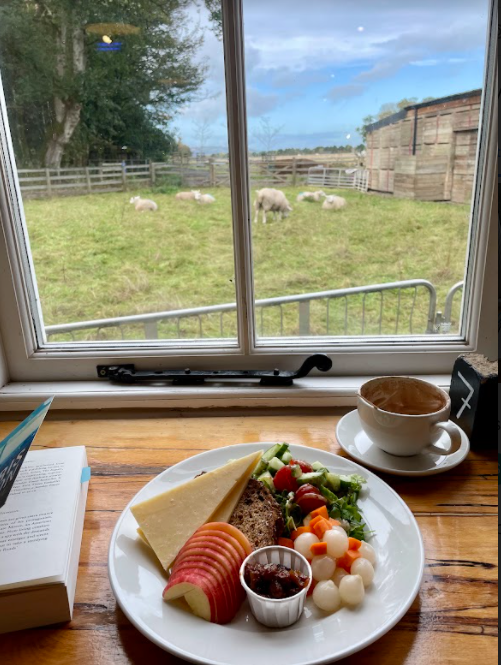
As I waved goodbye to my parents at the airport, donning my hiking backpack and KN95 mask, I was prepared for a semester full of surprises. I knew my year abroad would throw challenges at me that I would not be able to anticipate (with the uncertainty of COVID-19 as the cherry on top) and I was certainly correct.
I have spent hours on the phone with various customer service representatives from my UK cellular service provider, endured unexpected days of quarantine, lost my credit card and retraced my steps to find it amid pre-sliced mangoes in a Tesco refrigerator, and had to figure out how to use public transportation to get to the Isle of Skye when my train to Inverness was canceled last minute.
While I had to tackle each of these unexpected challenges as they arose, I have yet to face the one challenge I had been banking on encountering since I decided to come to St Andrews: being a vegetarian in a country whose signature dish is sheep organs minced with spices and stuffed into the animal’s stomach.
I had been warned: meat, potatoes and beer sustain the Scottish. It is true that hearty food is imperative to keep warm and raise spirits when things get cold, grey and blustery here. However, the honor of hosting the climate conference COP26 has pushed Scotland to lead the UK into a culture of plant-based and sustainable eating. Now those hearty Scottish culinary staples are largely vegetarian friendly.
Scotland had been preparing for COP26 long before I arrived in Sept. 2021. Everywhere you turn, you can find signage stamped with the conference’s official seal providing tips on saving carbon. Menus around the small town of St. Andrews highlight the lowest carbon selection. The university’s dining halls serve vegetarian haggis every morning, and I have yet to see them serve the meaty original. Cafés do not charge an extra fifty pence for plant-based milk in your cappuccino. It is the norm to walk or cycle rather than drive the mile to get around town. Furthermore, restaurants and cafés stress the importance of their ingredients being locally sourced. I even noticed signage for the conference in the Key Botanical Gardens in London — climate change communication is as common in the UK as street signs and corner pubs.
Eating a plant-based diet combats climate change on several levels. Reducing meat consumption represents one of the most important individual actions one can take to minimize personal carbon footprints. Meat consumption leads to increased levels of the greenhouse gases like carbon dioxide and methane in the atmosphere. Raising animals for slaughter strips bare land that could otherwise be used for organic plant-based agriculture or carbon sequestration via reforestation. The overbreeding of farm animals also releases unsustainable amounts of methane into the atmosphere.
Though one person altering their eating habits hardly minimizes global greenhouse gas emissions, a cultural shift toward plant-based diets, such as the one emerging in Scotland, could encourage the sustainable repurposing of land. The trend could even spread to the rest of the world — I noticed similar plant-based initiatives in London, the total opposite end of the UK. Establishing a plant-based culture could be crucial as nations collaborate to create a cooler future with net-zero emissions.
Travel sites, food blogs and estimations of vegetarians per capita reveal that, surprisingly, the UK is one of the most vegetarian-friendly nations in the world; the US ranks fairly low in comparison.

I have been in the UK for two months now and have been able to explore the local culinary scene and scout out some favorite sustainable markets and restaurants.
Balgove Larder is situated on a farm about a mile away from the town of St. Andrews. To get there, you must walk down a dirt road flanked by fields dotted with fluffy white sheep and beds of the season’s vegetables. Balgove offers a café, a more formal restaurant, a flower shop and a marketplace where you can buy fresh baked goods, produce and (yes) locally sourced cuts of meat. Their mission is to encourage sustainable eating by offering a variety of delicious vegetarian choices and ensuring that the meat they do sell is sourced within a few miles of St Andrews.
Brewdog, a chain of pubs scattered across the UK, advertises Vegan Mondays and displays the number of kilograms of carbon dioxide produced in the making of each menu item, encouraging diners to opt for the most carbon-friendly option. Brewdog markets itself similarly to any American sports bar, serving up beer, burgers, wings and fries (sorry, chips), but also boasts a half plant-based menu.
“Lovers of all things plant-based will be spoilt for choice as half of our menu is vegan or vegetarian,” the pub chain’s website reads. I am usually not one for vegan imitation meat products, but I tried Brewdog’s vegan chicken wings and enjoyed every bite. I felt like I was a part of the whole pub experience and did not have to sacrifice the fun of having a bite with my pint due to being vegetarian. Brewdog works to normalize eating plant-based and include vegetarians and vegans in the pub eats scene.
I have also noticed that cafés and restaurants in St. Andrews and Edinburgh will strategically place vegetarian options higher up on menus, prioritizing plant-based options by presenting them to diners before the meaty options. Menu engineers encourage placing items you want to sell at the top or center of the page, which is exactly where many restaurants around town place their plant-based menu items.
My culinary experience in Scotland has been exciting and eye-opening. I continue to try new and wonderful foods. I have found the home of my favorite sandwich in the whole world — shoutout to the Roma sandwich at Rocca Italian Deli. I came in expecting to eat mashed potatoes and mushy peas for breakfast, lunch and dinner every day, but discovered a flourishing culinary scene of delicious roasted seasonal vegetables, rich and decadent desserts, and deviously greasy, salty and chunky chips. St. Andrews has normalized plant-based culture, and I hope the world leaders here for COP26 will bring this new passion for sustainable eating back to their home nations.

















